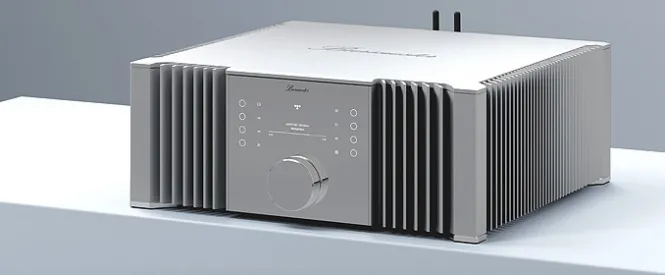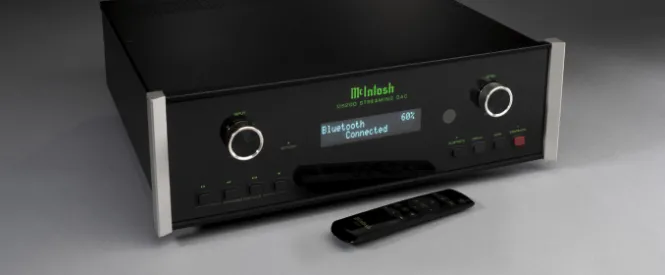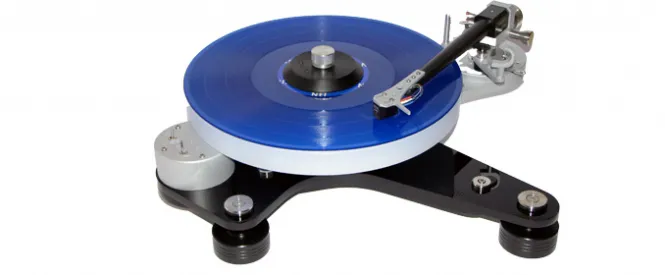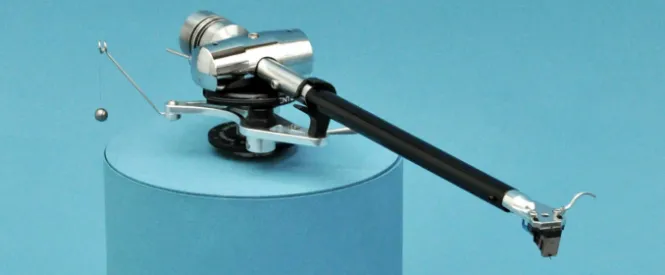Reloop Turn 7 Turntable Review
James Michael Hughes takes this great value, versatile and easy-to-use turntable package for a spin…
Reloop
Turn 7 Turntable
£959
Here's a handsome and stylish vinyl spinner that's aimed at bridging the gap between expensive high-end turntables and cheaper, more budget-orientated designs. Reloop is best known for making high-quality DJ turntables, but the Turn 7 is aimed squarely at hi-fi enthusiasts…
This well-thought-out, versatile package includes an Ortofon 2M Red moving magnet cartridge, a built-in phono stage, and a proper hinged lid. The deck sports a 20mm thick acrylic platter driven by a 5mm wide flat belt from a small low-vibration DC motor. The platter itself weighs around 1.7kg and is very accurately machined. Viewed from above at an angle, it's so flat it can be tricky to say whether or not it's spinning. Start-up times are fast, with the platter up to speed in a second or so.
The centre bearing rotates smoothly and noiselessly, ensuring very low rumble. The plinth, made from MDF, is finished in a high gloss piano black, and the whole assembly sits on four spring-decoupled aluminium feet to improve isolation. Lightly tap the plinth with a finger as an LP plays, and there's some mid-frequency noise audible, but nothing too serious or unusual for a turntable of this price. A more expensive deck would add some additional damping to reduce this noise, but doubtless, that would increase the cost.
The platter is internally illuminated via twenty blue LEDs located around the centre bearing. These LEDs light the edge of the platter, making the Turn 7 look rather smart and elegant; the effect is striking, although it might not be to everyone's taste.
Fortunately, you can always switch off the lights if you prefer a more subdued, understated look. It might just be my imagination, but I think the deck sounds ever so slightly cleaner with the lights turned off. Try playing an LP that sounds a little bright and congested and compare – see what you think! A 4mm-thick fibre mat is included but not mandatory. To my ears, the sound is a bit crisper and sharper without the mat and smoother and more damped with it. I did most of my listening using the mat.
The tonearm is a high-quality item with a carbon-fibre tube and detachable headshell. To allow optimisation for VTA, it's adjustable for height, with user-variable tracking weight and bias compensation. The headshell attaches via the popular SME fixing. Given that many modern turntables are not supplied with a dust cover, it's good to have one included with the Turn7. It's even hinged too – luxury!
If you're thinking of adding vinyl replay to your system, it's useful if your amplifier has a phono stage. Alas, not all are thus equipped, but as the Turn 7 has its own built-in unit, it's no problem if your amplifier only has line inputs. This turntable's internal phono stage is very good, but if you had a better one in your amp, then it's possible to bypass the Reloop's internal phono stage and connect the cartridge directly.
For those who want to digitise their collection of vinyl via programmes such as Audacity, Reloop has helpfully provided the Turn 7 with a USB output. Again, this simplifies the whole process and cuts out a lot of faffing about. The deck comes with a connecting cable with phono plugs at both ends, which is of decent quality. Of course, you can upgrade to a specialist cable that's even better, particularly if you're connecting it to an external phono stage.
The bundled Ortofon 2M Red has an elliptical stylus and produces a healthy 5.5mV output, playing at a downforce between 1.6g to 2g, with 1.8g recommended. At this pressure, it tracks pretty well, though I preferred to nudge the playing weight up a tad so it was closer to 2g in order to get better tracking and slightly reduced sensitivity to surface noise. There's good clearance between the cartridge body and LP surfaces. Buyers might consider upgrading the cartridge at some future date, but the supplied one performs surprisingly well.
It is clear that a good deal of thought has gone into the design of the Turn 7 in order to make it as simple, straightforward and user-friendly as possible. Straight out of the box, you can have the deck up and running in under half an hour – it's all very simple and straightforward. It's likely that for many buyers, this will be their first taste of vinyl – so what can they expect?
THE LISTENING
Reloop's Turn 7 is a most impressive product at the price. The first thing that strikes you about this deck's sound is its very good speed stability – which isn't always the case with belt-drive turntables, even expensive ones. It helps that the deck's drive belt is one-piece rather than spliced; it feels quite 'grippy' with a slightly roughened surface.
Then there's its fine built-in phono stage and excellent bundled cartridge. The former produced good results and is whisper-quiet in terms of residual hiss and hum. The latter is a highly regarded modern moving magnet design that delivers a clean and open sound with good detail and dynamics.
Playing the Oscar Peterson Trio's album We Get Requests, the piano came over as bright and pearly, while double bass was full-bodied and woody. Drums had a nice crisp attack, and surface noise was low. All told, the reproduction was extremely satisfying. There was a holographic 'out of the speaker boxes' quality to the sound, which is typical of a good vinyl front end. This LP sounded more alive and relaxed – something you get with proper analogue sources. Bass was fuller and deeper than expected, with greater amplitude and warmth.
The Turn 7 has a clean midband that reveals a good deal of detail. On an old 1969 Philips LP of Debussy's La Mer and Nocturnes with Eliahu Inbal and the Amsterdam Concertgebouw Orchestra, I was impressed by this deck's ability to extract lots of subtle information from these complex multi-layered scores. The recording itself is slightly low-level and needs a little persuasion to sound vivid and focused. On some set-ups, the sound can seem a bit recessed, but not on the Turn 7, which was solid and full-bodied. Dynamics were surprisingly good, too.
Another album that sounded surprisingly good was a compilation of Phil Spector's 'Wall of Sound' tracks – an LP I bought back in the nineteen eighties, with hits like Be My Baby and River Deep, Mountain High. These old recordings had remarkable depth and presence with the Turn 7 – an excellent result for an affordable deck. Then, going from one extreme to another, I tried Eric Dolphy's 1964 jazz album Out to Lunch on Blue Note. The Reloop handled the wide extremes of this rather unruly masterpiece of organised chaos with aplomb, usefully clarifying what was being played in musical terms.
Indeed, just about every LP I chose to play sounded good and was reproduced without problems. Take ABBA's Voulez-Vous, for example, which came over as crisp, bright, and forward but nonetheless tonally well-balanced and clear. Pop recordings from the seventies can easily sound glassy and thin, but the Turn 7 managed to strike a nice balance between explicit detail on the one hand and warmth, richness, and weight on the other.
Put up against my far more expensive Pro-Ject Xtension 10, the latter offered greater firmness and conviction, as you would expect. Yet the Reloop wasn't disgraced by the comparison – far from it. It's a tad lighter and more circumspect but thoroughly listenable all the same. So it's the perfect choice for those who fancy adding vinyl replay to their hi-fi but don't want anything too complicated or fussy.
THE VERDICT
Having a few foibles is all part of the vinyl experience. That little ball of fluff on the stylus from time to time, for example, and the soft clack-clack-clack when the stylus reaches the end of the run-out groove. There's nothing quite like it, especially now when it's possible to get clean sounds with no background noise from downloads, streaming, and CD. Yet some people actually like this quirkiness and want to get in on the vinyl act…
The Reloop Turn 7 is perfect for this sort of buyer. It's a relatively simple deck that's easy to set up and use and has lots of gadgets like a USB phono output and a nice moving magnet cartridge. It's not the absolute best at its price in pure sound quality terms, yet is highly persuasive as an overall package. You need to spend a fair bit more cash to get a deck with significantly greater authority and subtlety than this. This deck does all the basics extremely well and isn't lacking in any specific area. It's an excellent choice for those seeking a fine-sounding, fuss-free, all-in-one turntable package. Vinyl without tears, you might say.
Visit Reloop for more information
James Michael Hughes
An avid audiophile for many decades, Jimmy has been writing about hi-fi since 1980 in a host of British magazines, from What Hi-Fi to Hi-Fi Choice. Based in London, England, he’s one of the UK’s most prolific record and CD collectors – no streaming service can yet match his amazing music collection!
Posted in: Turntables | Hi-Fi
JOIN IN THE DISCUSSION
Want to share your opinion or get advice from other enthusiasts? Then head into the Message
Forums where thousands of other enthusiasts are communicating on a daily basis.
CLICK HERE FOR FREE MEMBERSHIP
Trending
applause awards
Each time StereoNET reviews a product, it is considered for an Applause Award. Winning one marks it out as a design of great quality and distinction – a special product in its class, on the grounds of either performance, value for money, or usually both.
Applause Awards are personally issued by StereoNET’s global Editor-in-Chief, David Price – who has over three decades of experience reviewing hi-fi products at the highest level – after consulting with our senior editorial team. They are not automatically given with all reviews, nor can manufacturers purchase them.
The StereoNET editorial team includes some of the world’s most experienced and respected hi-fi journalists with a vast wealth of knowledge. Some have edited popular English language hi-fi magazines, and others have been senior contributors to famous audio journals stretching back to the late 1970s. And we also employ professional IT and home theatre specialists who work at the cutting edge of today’s technology.
We believe that no other online hi-fi and home cinema resource offers such expert knowledge, so when StereoNET gives an Applause Award, it is a trustworthy hallmark of quality. Receiving such an award is the prerequisite to becoming eligible for our annual Product of the Year awards, awarded only to the finest designs in their respective categories. Buyers of hi-fi, home cinema, and headphones can be sure that a StereoNET Applause Award winner is worthy of your most serious attention.





